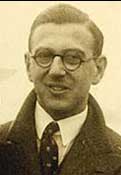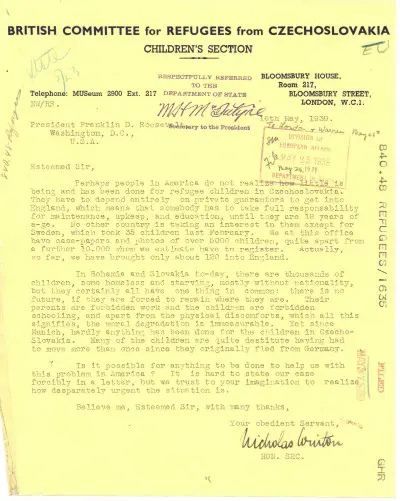Nicholas Winton
(1909 - 2015)

In 1939, the English stockbroker Nicholas Winton rescued 669 Czech children from their doomed fate in the Nazi death camps, but his achievement went unrecognized for more than half a century. For 50 years most of the children did not know to whom they owed their lives. The story of Nicholas Winton only emerged when his wife Greta came across an old leather briefcase in an attic and found lists of the children and letters from their parents. He hadn't even told her of his role during the war.
Nicholas Winton, a 30-year-old clerk at the London Stock Exchange, visited Prague, Czechoslovakia, in late 1938 at the invitation of a friend at the British Embassy. When he arrived, the British team working in newly erected refugee camps asked him to lend a hand.
He spent a few months in Prague and was alarmed by the influx of refugees endangered by the imminent Nazi invasion. He immediately recognized the advancing danger and decided to make every effort to get the children outside the reach of Nazi power.
The commission was dealing with the elderly and vulnerable, and people in the camps kept telling me that nobody was doing anything for the children,
Nicholas Winton later recalled.
Word spread about the Englishman of Wenceslas Square,
and parents flocked to the hotel to try to persuade him to put their children on the list, desperate to get them out of the country before the Nazis invaded. It seemed hopeless,
he said years later. Each group felt that they were the most urgent.
But Winton managed to set up the organization for the Czech Kindertransport in Prague in early 1939 before he went back to London to handle all the necessary matters from Britain.
In London, Winton began organizing transport to get the children out of the country in cooperation with the British Committee for Refugees from Czechoslovakia and the Czechoslovak travel agency Cedok. He was required to find a foster family for each child that could produce a 50-pound guarantee. He also raised money to help pay for transportation for the children of poorer families.
During an interview on CBS’s 60 Minutes
" in April 2014, Winton said he tried to send children to the U.S. as well, who refused. He said he wrote a letter to then-President Franklin D. Roosevelt explaining the urgent need to transport children out of the country and asked for any support the U.S. could provide.
 The original letter Winton sent to President Roosevelt asking for American support to evacuate children from Czechoslovakia (NARA). The original letter Winton sent to President Roosevelt asking for American support to evacuate children from Czechoslovakia (NARA). |
As the war continued, Nicholas Winton managed to arrange for 669 children to leave on eight different trains from Prague to London (a small group of 15 were flown out via Sweden). The ninth train - the biggest transport - was to leave Prague on September 3, 1939, the day Britain entered the war - but the train never left the station. Within hours of the announcement, the train disappeared,
Winton later recalled. None of the 250 children on board was seen again. We had 250 families waiting at Liverpool Street that day in vain. It would have come through if the train had left a day earlier. Not a single one of those children was heard of again, which is an awful feeling.
None of the children set to flee that day survived the following years. Later, more than 15,000 Czech children were also killed.
Winton never forgot the sight when the exhausted children from Czechoslovakia piled out of the trains at London's Liverpool Street station. All wore name tags around their necks. One by one, English foster parents collected the refugee children and took them home, keeping them safe from the war and the genocide that was about to consume their families back home.
Winton, who gave these children the gift of life, watched from a distance.
Winton, one of the unsung heroes of World War II, known as the Schindler of Britain, is still revered as the father who saved scores of his children
from Nazi death camps.
Vera Gissing, one of the children saved by Winton, has written his biography and scripted the film Power of Humanity. She says: He rescued the greater part of the Jewish children of my generation in Czechoslovakia. Very few of us met our parents again: they perished in concentration camps. Had we not been spirited away, we would have been murdered alongside them.
In September 2001, Nicholas Winton was the guest of honor at the film premiere of his story in Prague. Winton was invited by Czech President Vaclav Havel and around 250 of the 664 people he saved were expected at the event. The biography, Nicholas Winton and the Rescued Generation, by Muriel Emmanuel and Vera Gissing (Vallentine Mithchell Press) was published in 2001. A Slovakian film entitled: Nicholas J. Winton - Power of Good is also in the works.
Winton insists he wasn't anything special, adding I just saw what was going on and did what I could to help.
But survivor Vera Gissing said: I owe him my life and those of my children and grandchildren. I was lucky to get out when I did and having the chance to thank Nicky was the most precious moment in my life.
The survivors, though many are now grandparents, still call themselves “Winton’s children.” Among the children saved was Dagmar Simova, cousin of the Czech-born U.S. Secretary of State Madeleine Albright. Lady Milena Grenfell-Baines, whose father, Rudolf Fleischmann saved Thomas Mann by assisting him to gain Czech citizenship for his self-imposed exile from Germany after the rise of Hitler. Joe Schlesinger, the CBC correspondent. Julius Sidon from California, the brother to Chief Rabbi Karol E. Sidon of the Czech Republic. Lord Dubs, a Member of Parliament. Hugo Merom, the ex-Israel Air Force pilot and consultant who specializes in airport planning. And acclaimed film director Karel Reisz. Forty-five years later Reisz met Nicholas Winton at the first reunion. “I had never heard of him. I thought the Red Cross had organised it,” he said. “I took my children and grandchildren - I think it brought it alive to them to learn where their grandfather came from. It was very emotional.”
Winton lived his last years in Maidenhead, Great Britain. He was honored as a Member of the British Empire (MBE) in 1983 for his charitable work for the Abbeyfield Houses, a large elderly care home. He was honored in the summer of 1998 at an event called “Thank You Britain,” which was sponsored by the Czech ambassador to Britain. On October 28, 1998, Vaclav Havel, President of the Czech Republic, awarded him the Order of T. G. Masaryk in a grand ceremony in Hradcany Castle. In December 2002, Winton received a knighthood from Queen Elizabeth II.
Winton was born to Jewish parents who converted and baptized him. Because of this, Israel has never recognized him as one of the Righteous Gentiles at Yad Vashem. Not that it mattered to Winton: As far as he was concerned, his actions weren’t anything extraordinary.
Winton passed away peacefully at age 106 on July 1, 2015, with his daughter and his grandchildren at his side.
In 2024, a film about his rescue efforts, One Life, was released.
Sources: “Nicholas Winton, who saved Jewish children during the Holocaust, dies at 106,” Haaretz, (July 1, 2015).
Susan Poizner, “Winton’s Wartime Gesture,” The Holocaust.
Jerusalem Report, (August 31, 1998).
“Honor for ‘British Schindler,’” BBC News,(September 26, 2002).
“British ‘Schindler’ gets knighthood,” CNN, (December 31, 2002).


